
Leverage Google, YouTube, and Bing's search predictions to capture 71% of the traffic.
Imagine having near-exclusive access to 71% of the search engine traffic for your company’s most desired keywords. Our team can influence search engines’ autocomplete suggestions (called “search predictions”) to insert your brand name into search predictions, driving more traffic to your website.
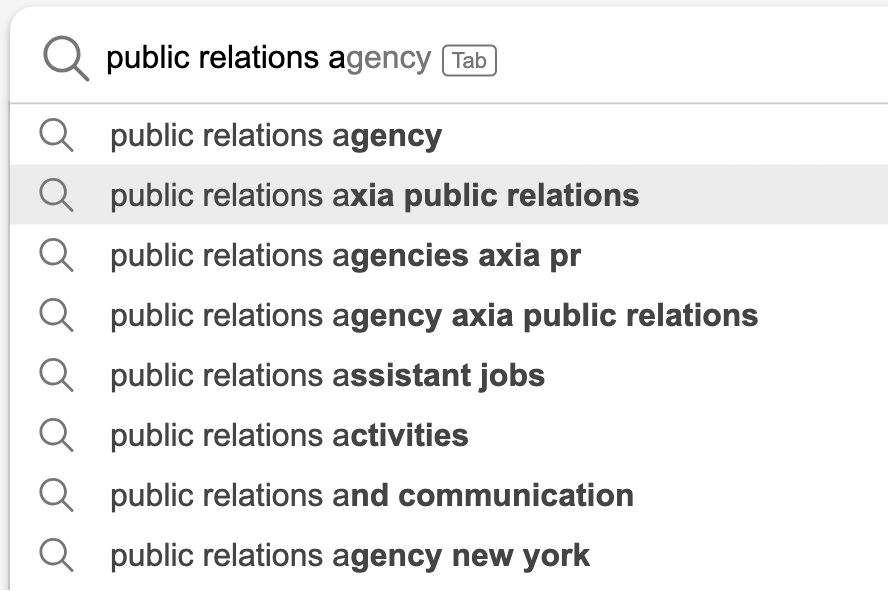
Axia's team began digital content creation in 1994 and search engine optimization in 1998. Today, digital content remains our specialty. By working in content marketing for more than two decades, we’ve uncovered the newest and most powerful SEO technique: Autocomplete (a unique feature of our company).
When someone sees your company name in a search prediction, they'll have higher confidence in you. With this first impression, they'll click on the search prediction with your name 71% of the time, according to Google.
According to Google, "Autocomplete predictions reflect real searches done on Google. To determine what predictions to show, [Google’s] systems look for common queries that match what someone starts to enter into the search box but also consider:
These factors allow autocomplete to show the most helpful predictions unique to a particular location or time (such as trending topics).
In addition to full search predictions, Autocomplete may also predict individual words and phrases that are based on both real searches as well as word patterns found across the web.”
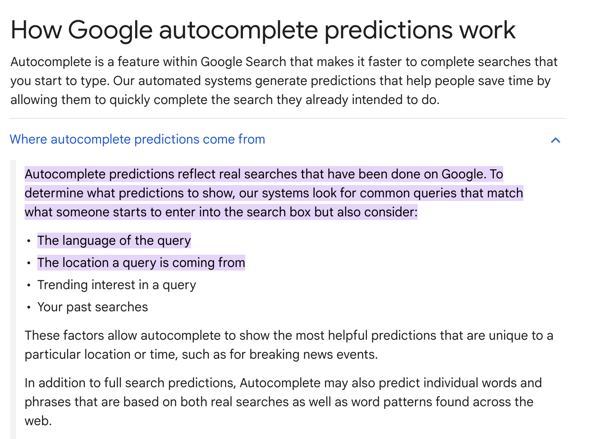
Start typing the keywords below. See what happens as the search engine displays search predictions with the following organizations who use this technique.
Christini's Ristorante Italiano: Christini's Ristorante Italiano, who hired us for public relations work, uses this technique and is the only brand name that appears in search predictions as you start typing "fine dining Orlando" on Bing, YouTube, and Google.
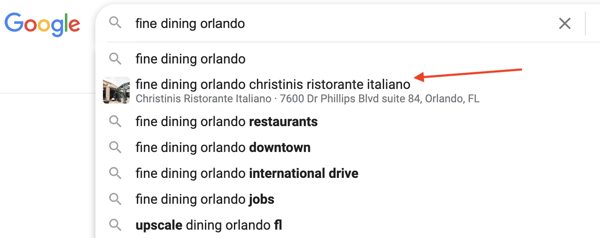
Walmart: On Bing, you'll see Walmart is experimenting with the Autocomplete search engine optimization technique (in Target's backyard!). Try entering "groceries Minneapolis" on Bing. Walmart store 2154 immediately appears as a search prediction. (Walmart actively using this SEO technique can give you confidence in this white-hat SEO technique.)
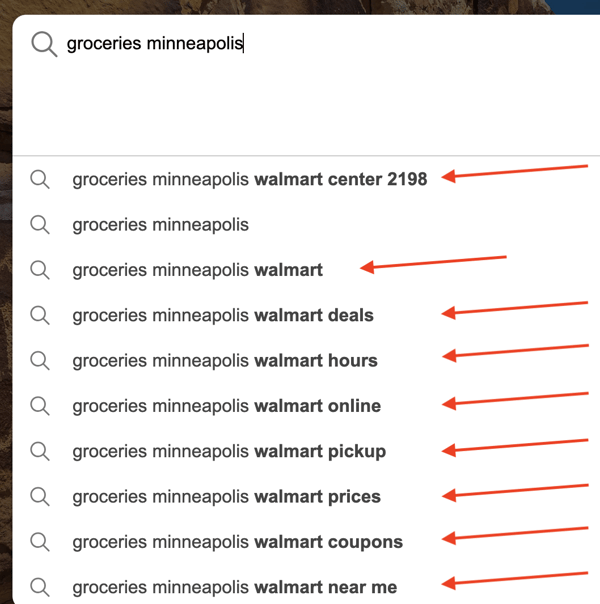
Attorney Michael O. Smith: Michael O. Smith, a Boston personal injury attorney, dominates Google's search predictions when searching for a personal injury attorney.

Want to see more? Help yourself to see the results and user experience firsthand.
On YouTube, begin typing:
You will then see the company name in action.
Try typing "Los Angeles plumbing" on Google and Bing to see the results:
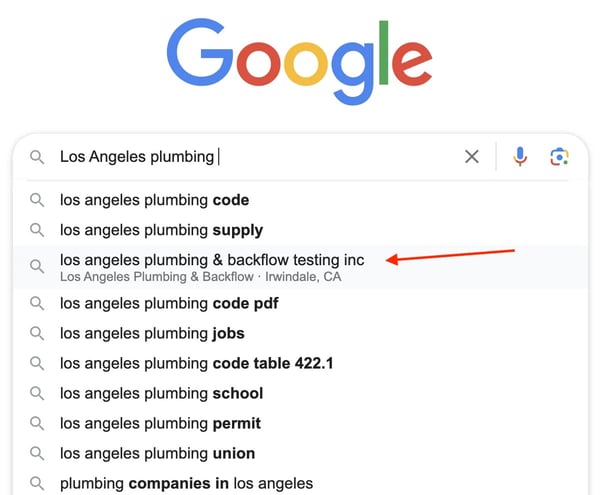
As SEO results are unpredictable, it would be unethical to guarantee success. However, we use best practices, and if you fall out of search box results, we'll pause monthly billing for 30 days if needed.
These are dropdown options that search engines automatically suggest when someone begins typing in a search box. The suggestions try to predict what the user wants the rest of their search to say. These search predictions were previously known as Google Suggest or search engine suggestions. Optimizing search predictions allows your organization to position itself as an authority, outsmart your competition, and gain more search engine traffic.
You need to know two terms: keyword phrase and tag phrase. Your selected keyword is the “keyword phrase” a user starts to type. It typically includes a description of your products or services and perhaps a city, industry, or other description. Next comes your “tag phrase,” which is typically your company name, brand name, or product/service names. Your tag phrase appears after the selected keyword phrase (e.g., in "dental practice in Pittsburgh Aspen Dental," the keyword phrase is "dental practice in Pittsburgh" and the tag phrase is "Aspen Dental").
The monthly investment varies based on which keyword phrases and search engines you select. We quote your selected keyword phrase based on its average monthly search volume (MSV), which often also indicates its level of SEO competition and difficulty. We use a third-party tool called keywordtool.io to identify the monthly search volume, and the investment ranges based on this volume.
For example:
Google states that 71% of all users engage in its autocomplete search predictions. When a user looks for your company’s product or service and sees the search engine predict your company name, it increases their confidence in your brand. Consumers are more likely to click on your site when they're confident in your brand. Therefore, our clients experience an immediate spike in site traffic, domain authority, and inbound leads from this service.
No. Google, Bing, and YouTube look at trends to influence search predictions. Our process uses the power of public relations, social proof, search trends, directory listings, backlinks, and promotional tactics to gain authority for your tag phrase (often your brand name), website, and keyword phrases. If we used black- or gray-hat methods, this technique wouldn't work. We create and build social influences to develop more online visibility. We use these public relations and white-hat SEO techniques to meet Google, Bing, and YouTube’s algorithm criteria for determining what to suggest in autocomplete predictions.
It’s a three-step process:
Based on our experience, this process only works on Google after you appear in search predictions on Bing or YouTube. So, we must start there.
The Autocomplete service for Google requires at least four keyword phrases, and each must also be purchased for Bing or YouTube.
As a limited-time offer, when you purchase keyword phrases for Bing, we’ll include the Autocomplete service on DuckDuckGo, MSN, and Yahoo for a one-time reservation equal to one month's investment. You’ll pay an upfront reservation investment equal to one month of Bing service for each platform to secure those keywords from competitors. Please note that under this offer, we do not guarantee ongoing monthly performance on DuckDuckGo, MSN, or Yahoo.
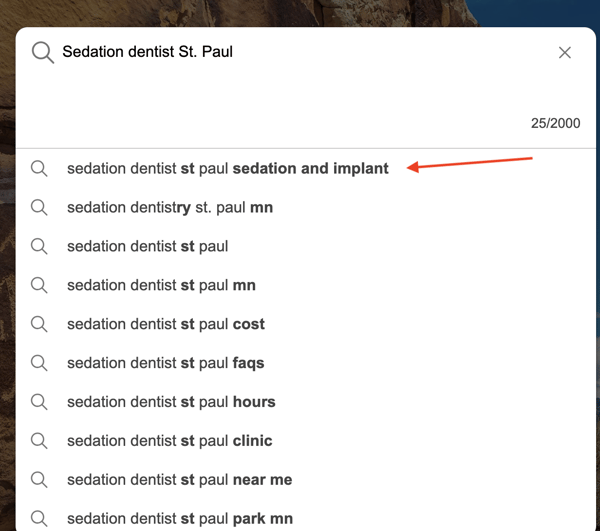
We'd be happy to perform research for you and recommend keywords your organization will value for many years. Your best option would be to opt into one of our SEO packages or hire us for a $1,000 one-time keyword consultation.
Your selected keyword and tag phrase must be 45 or fewer characters.
Once you’ve hired us to optimize a keyword phrase, your competitors (or any other organizations) no longer have the option to optimize that keyword phrase through Axia or our resellers for the duration of our business relationship.
Yes. Customers use search engines like Google, Bing, and YouTube because they have a need or want. When they begin their search, they are a prospect. When they see the search prediction with your company name, many will likely click on it.
When they click on the predicted search and the results page appears, most results they'll see will likely feature your company and its listings. (Of course, sponsored, pay-per-click, or Google Guaranteed content might display within these.) Once they click on your content, they’re shopping for your company and could become a registered lead by completing a form or a registered customer by purchasing directly from your site.
After you’re enjoying targeted traffic from search prediction optimization, you might want to continue traditional PPC to access the other 30% of consumers who don’t engage with Autocomplete’s suggestions. It’s up to you to assess and evaluate the traffic and conversions.
We’d highly recommend continuing your current SEO efforts. However, it’s not required, and we’d be happy to explore taking over your SEO or integrating that scope of work and corresponding investment into our Autocomplete SEO service.
Yes. Although we cannot track your phone calls or in-person visits, we can show you how to track increased traffic to your website and produce regular reports demonstrating the additional traffic and value we’re driving to your company’s website(s).
The time it takes can vary, depending on how competitive your selected keyword phrases are. We typically expect to see them in Bing's search predictions within three to eight weeks, on YouTube's within three to six months, and on Google's after several months, often more than 12 months.
For local keyword phrases and phrases with lower monthly search volumes (under 5K), it might take less time. National and high-traffic search terms (monthly search volumes of 15K+), on the other hand, might take longer.
After your initial reservation (equal to one month's investment), you do not pay for the Autocomplete service until the search engine suggests your Tag Phrase with your Keyword Phrases. Unlike with other SEO services and providers, you don't pay monthly for Autocomplete until it's working!
That’s simple.
|
Autocomplete
|
Pay-Per-Click
|
Autocomplete SEO is a unique marketing technique none of your competitors will have.
This opportunity allows you to be in front of:
Additional advantages:
Supplement your Autocomplete SEO service with Ranked, our search engine optimization service.